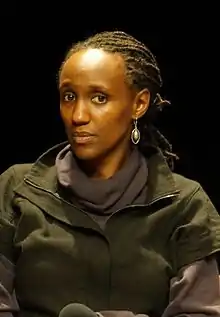Carole Karemera
Carole Umulinga Karemera (born 1975) is a Rwandan actress, dancer, saxophone player, and playwright.
Carole Karemera | |
|---|---|
 Karemera in 2015 | |
| Born | 1975 (age 45–46) |
| Nationality | Rwandan |
| Occupation | Actress, dancer, saxophone player, playwright |
Biography
She was born in 1975 in Brussels, the daughter of Rwandan exiles.[1] As a child, Karemara excelled at mathematics and dreamed of opening a bakery.[2] Karemera studied at the National Conservatory of Theater and Dance in Brussels. In 1994, her father, a journalist, returned to Belgium as a result of the Rwandan Genocide.[3] Karemera first discovered Rwanda on a motorcycle in 1996.[1] She performed in several plays, such as The Trojan Women by Euripides, The Ghost Woman by Kay Adshead, and Anathema, before starting her film career.[2] Between 2000 and 2004, she played the leading role in Rwanda 94. Her uncle, Jean-Marie Muyango, composed the score for the show.[3]
In 2005, Karemara starred as Jeanne in Raoul Peck's film Sometimes in April, about the Rwandan genocide.[4] The same year, she decided to settle in Kigali.[1] Upon moving to the country, Karemara became involved in cultural projects, including staging interactive plays in bars and in the streets of Rwandan cities, in order to create a common history. Along with Cécilia Kankonda, she set up a "sound cathedral" built from recordings of memories in which participants could tell their memories of Rwanda before 1994.[5] In 2006, Karemara and seven other women established the Ishyo Arts Center in Kigali to support culture in the capital, which did not have a theatre until that point.[1]
Karemara starred as Beatrice in the 2007 film Juju Factory. She received the Best Actress award at the Festival Cinema Africano in Italy.[6] She wrote the play "Chez l’habitant", about the experiences of women in Brussels, Kigali and Sevran.[1]
Karemara has served as the Deputy Secretary General of Arterial Network, as well as the Arterial Network Country Representative in Rwanda.[7] She starred in Peter Brook's 2016 play Battlefield, based on The Mahabharata.[8] In 2018, she received an award at the Les Journées théâtrales de Carthage, honoring her work in the theatre in Rwanda.[9]
Filmography
- 2005: Sometimes in April as Jeanne
- 2006: Sounds of Sand as Mouna
- 2007: Juju Factory as Béatrice
- 2008: Black as Pamela
References
- Charon, Aurélie (12 October 2018). "Carole Karemera, j'irai le dire chez vous". Libération (in French). Retrieved 2 October 2020.
- "Who are the stars of Rwanda's Hillywood?". The New Times. 11 July 2014. Retrieved 2 October 2020.
- Bédarida, Catherine (21 April 2004). "Carole Karemera incarne la douleur des résistants tutsis". Le Monde (in French). Retrieved 2 October 2020.
- Lacey, Marc (17 February 2004). "Rwanda Revisits Its Nightmare; Filmmaker, in HBO Project, Uses Survivors and Actual Sites to Recount 1994 War". New York Times. Retrieved 2 October 2020.
- Kodjo-Grandvaux, Séverine (15 December 2016). "Carole Karemera veut reconstruire le Rwanda grâce au théâtre de rue". Le Monde (in French). Retrieved 2 October 2020.
- Mahnke, Hans-Christian. "Review of "Juju Factory"". Africavenir. Retrieved 2 October 2020.
- "Carole Karemara". Arterial Network. Retrieved 2 October 2020.
- Kantengwa, Sharon (21 April 2016). "You can use art to speak to the world - Carole Karemera". The New Times. Retrieved 2 October 2020.
- Mazimpaka, Magnus (8 December 2018). "Rwandan Actress Carole Karemera Receives Great Award In Tunisia". Taarifa. Retrieved 2 October 2020.